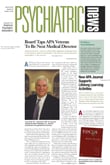Cognitive-behavioral therapy (CBT) is no sure-fire cure for binge-eating disorder. Yet until now no other psychotherapy has been shown to be as effective against the disorder. CBT consists of strategies to help binge eaters normalize their eating habits. For instance, writing down foods eaten, times eating occurred, and the eating context helps binge eaters identify times and situations in which binge eating is more likely to occur and often makes it clear to them how chaotically they’ve been eating. The therapy also includes strategies to help binge eaters realize that, even if they are overweight, people are still going to like them.
Now interpersonal psychotherapy has been found to be as effective for binge-eating disorder as is cognitive-behavioral therapy in a study headed by Denise Wilfley, Ph.D., an associate professor of psychiatry and psychology at Washington University School of Medicine, and coworkers. They report their findings in the August Archives of General Psychiatry.
Interpersonal Problems
Interpersonal psychotherapy for binge-eating disorder helps people identify interpersonal problems that may predispose them to compulsive overeating and learn how to correct those difficulties. For instance, people with the disorder may lack the skills to make friends, so they turn to food when lonely. They may turn to the same solution after fighting with a partner, in which food provides some solace.
In 1993 Wilfley and coworkers reported evidence suggesting that interpersonal psychotherapy might be just as good a treatment for binge-eating disorder as cognitive-behavioral therapy. Because the study was based on a modest sample (56 participants), however, they decided to again pit interpersonal therapy against cognitive-behavioral therapy in treating the disorder, but this time using 162 subjects.
The subjects were randomly assigned to 20 weekly sessions of either cognitive-behavioral therapy or interpersonal psychotherapy. Although the sessions were group sessions, each participant also received individual sessions before, in the middle, and at the end of treatment to individualize the intervention for each participant.
Subjects’ binge-eating habits and weight were assessed before treatment, after the weekly treatment sessions ended, and at four-month intervals up to a year after treatment.
Binge-eating recovery rates, the researchers found, were comparable for both treatment groups immediately after treatment ended (79 percent for cognitive-behavioral therapy and 73 percent for interpersonal psychotherapy). Binge-eating recovery rates were also similar for both treatment groups one year after treatment had ended (59 percent for cognitive-behavioral therapy and 62 percent for interpersonal psychotherapy).
True, persons with binge-eating disorder often struggle with being overweight as well as with binge eating, and all of the 162 subjects in this study were overweight. Neither type of therapy led to a dramatic reduction in weight in a number of subjects. Specifically, there was a statistically significant average decrease in body-mass index for participants in both groups from baseline to the one-year follow-up, but the decrease was not enough to reduce the health risks associated with being considerably overweight.
Nonetheless, some individuals in each treatment group did manage to lose enough weight to benefit their health. These were the subjects who had abstained from binge eating at the end of treatment until the one-year follow-up.
Focus Away From Food
The finding that interpersonal psychotherapy is just as good as cognitive-behavioral therapy in halting binge eating and overconsumption should prove heartening to those who engage in both behaviors, one of the study’s co-authors, Brian Saelens, Ph.D., assistant professor of pediatrics at Cincinnati Children’s Hospital Medical Center, said. Interpersonal psychotherapy, he explained to Psychiatric News, “is a novel approach relative to many of the approaches that individuals with binge-eating disorder have tried before. It takes some of the focus away from food and eating—issues that individuals with binge-eating problems have often struggled with most of their lives.”
The study was supported by grants from the National Institute of Mental Health.
